Samuel Adams: Revolutionary Founder
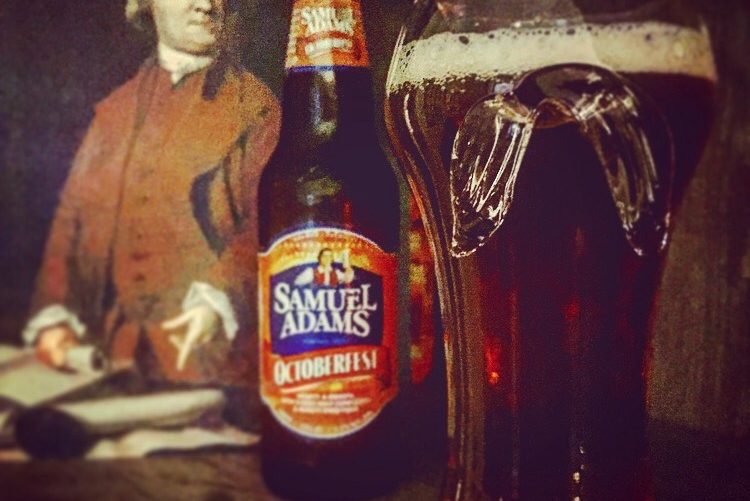
After two beers, I become an inspired genius. The same can be said for the folks responsible for some pretty incredible stuff. . .
Now, I know I’m on slippery slope here. If you rely on alcohol to figure out your problems or use it as a source of creativity, you have a drinking problem. For every Ernest Hemingway, Winston Churchill, Ulysses S. Grant or Edgar Allen Poe, there are countless others whose alcohol use has destroyed lives. Historically speaking though, the prevalent use of alcohol in American society, including among those who make the decisions, has undeniably had a significant impact.
Drinking in Colonial America
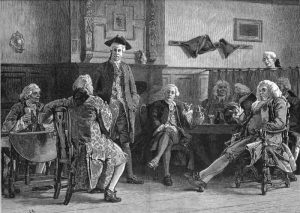
Let’s take colonial America as an example. At a time when sanitary conditions were less than ideal, spirits often proved to be the safest choice when it came to beverages. The absence of dysentery and cholera aside, colonists believed alcohol was much safer to drink in hot weather than cold water. It also served as the perfect morning pick-me up and afternoon revitalizer. Even the Puritans, they of the “Let’s ban Christmas!” and “Playing cards are evil!” persuasion, saw nothing wrong with drinking in moderation.
An estimate found in Mark Edward Lender and James Kirby Martin’s Drinking in America: A History places the average amount of pure alcohol (ethanol) ingested by colonists 15 and older at around 6 gallons every year which is double the current average. In easier to ingest terms, that could add up to 34 gallons of beer or cider (around 332 12oz bottles), 5 gallons of distilled spirits (19 liter bottles) and about a gallon of wine (around 5 bottles). While I’m sure I, as well as many others, reached and surpassed that amount in college, it’s a staggering number to keep up once you’ve become a productive member of society.
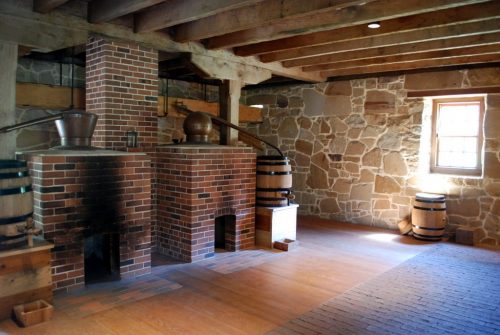
Even the Founding Fathers weren’t exempt from the generous imbibing of colonial America which may come as a shock to some. Now I’m not saying that Thomas Jefferson downed a fifth of whiskey while writing the Declaration of Independence, or that George Washington sailed across the Delaware River on Christmas Day puking his guts out because of an ale too many, but there is no doubt that they enjoyed drinking on a daily basis. Jefferson enjoyed the “easy flow of conversation” after the wine was opened, Washington owned a distillery and brewery, and even stodgy old John Adams started his day off with a pint of cider. What does this mean for us Americans? The struggle for independence and creation of our country were spearheaded by a bunch of guys rocking the “I’m a genius problem solver, aren’t I?” buzz.
Samuel Adams: Revolutionary Leader, Brewing Failure

September 27th marked the birthday of one of those intrepid boozehounds and the only one to have an entire brewery named after him: Samuel Adams. Although many people simply know Sam Adams as that weird looking old dude who’s on a beer bottle, he actually played a pivotal role in the events leading up to the American Revolution. Boston born and Harvard educated, Adams failed as a merchant, maltster (producer of the malts needed to brew beer) and newspaper editor before realizing that politics were his true calling. His political career began in 1747 when The Boston Caucus, an informal political organization that held considerable sway in Boston and, surprise, surprise, met in a tavern, backed young Adams and secured him a position as a clerk of the Boston market.
It wasn’t until the end of the French and Indian War in 1763, however, that Sam Adams became a major force in Massachusetts politics. In an attempt to recoup the money spent defending the colonies, the English Parliament passed the Sugar Act in 1764 which placed a duty on non-British sugar, molasses (used in making rum), some wines and coffee. While the Sugar Act actually decreased the previous tax on molasses, authorities were instructed that it must be collected, as opposed to maintaining their lassiez-faire attitude toward the duties. And as every kid who’s ever read “Donkeys Can’t Sleep in Bathtubs and Other Crazy Laws” knows, it’s one thing to have a law on the books, and another to actually enforce it. Astonishingly, the British didn’t realize it was a bad idea to piss off the people who drank booze and coffee in the colonies (i.e. EVERYONE). As a result, many colonists, Adams included, viewed this taxation it as a violation of colonial rights and worked to get it repealed.

Adams was a vocal leader in the Massachusetts Assembly throughout the growing tension between the colonies and England. Besides writing articles for Boston papers, he helped organize the Sons of Liberty, created the Boston Committee of Correspondence, recruited men like Joseph Warren and his second cousin John Adams into the cause and organized boycotts of British goods. Modern-day locavores might also be interested to know that Adams strongly urged local brewers and distillers to make better product “so that we may no longer beholden to foreigners for acredible liquor.” Who knew the “Drink Local” movement had deep roots in American history?
Adams’ tireless work for the Patriot cause, which was likely fueled by a multitude of drams, swigs, and pints, secured him elections to the 1st and 2nd Continental Congresses. Once the Revolution ended, Adams returned to Massachusetts where he served in local politics, first as lieutenant governor and then governor, until he retired completely from politics in 1797. Even before his death in 1803, many people considered Sam Adams to be one of the more controversial Founding Fathers. Much of this controversy has stemmed from two major claims. First, some called into question his close connection to the “mobbish” actions of the Bostonians, even though he never directly called for violence or destruction of property. Others asserted that he tried to steer the colonies toward independence from the very beginning of the protests, a fact which is highly disputed by many modern historians. Unfortunately, this negative characterization of Adams prevailed for decades which led him to be one of the more forgotten Founding Fathers. However, even if you just see him as a master manipulator and rabble rouser who frequented bars to round up drunks to do his dirty work, there is no denying the tremendous role Adams played in the events leading to the American Revolution.
Beer Pairing: Boston Beer Co.
So where do the Boston Beer Co. and Sam Adams Boston Lager come into the picture? Flash forward 181 years later and a young Jim Koch decides to start a “brewing revolution” to provide an alternative to woeful beer options in the mass market. Personally, a world where my only options are Bud, Coors, Miller is not a world I would want to live in, so I’m perpetually thankful for craft beer pioneers like Koch. Looking for a name to capture a thirsty audience, Koch chose Samuel Adams “. . . because Samuel Adams was a Boston firebrand, a revolutionary thinker who fought for independence. Most importantly, Samuel Adams, was also a brewer who had inherited a brewing tradition from his father.” (https://www.samueladams.com/history). While calling Adams a brewer is a bit of a stretch, he ran his father’s malting business (not brewery) into the ground, there is no denying that he was the perfect historical figure to be at the forefront of another Revolution; a decidedly much safer and tastier one.
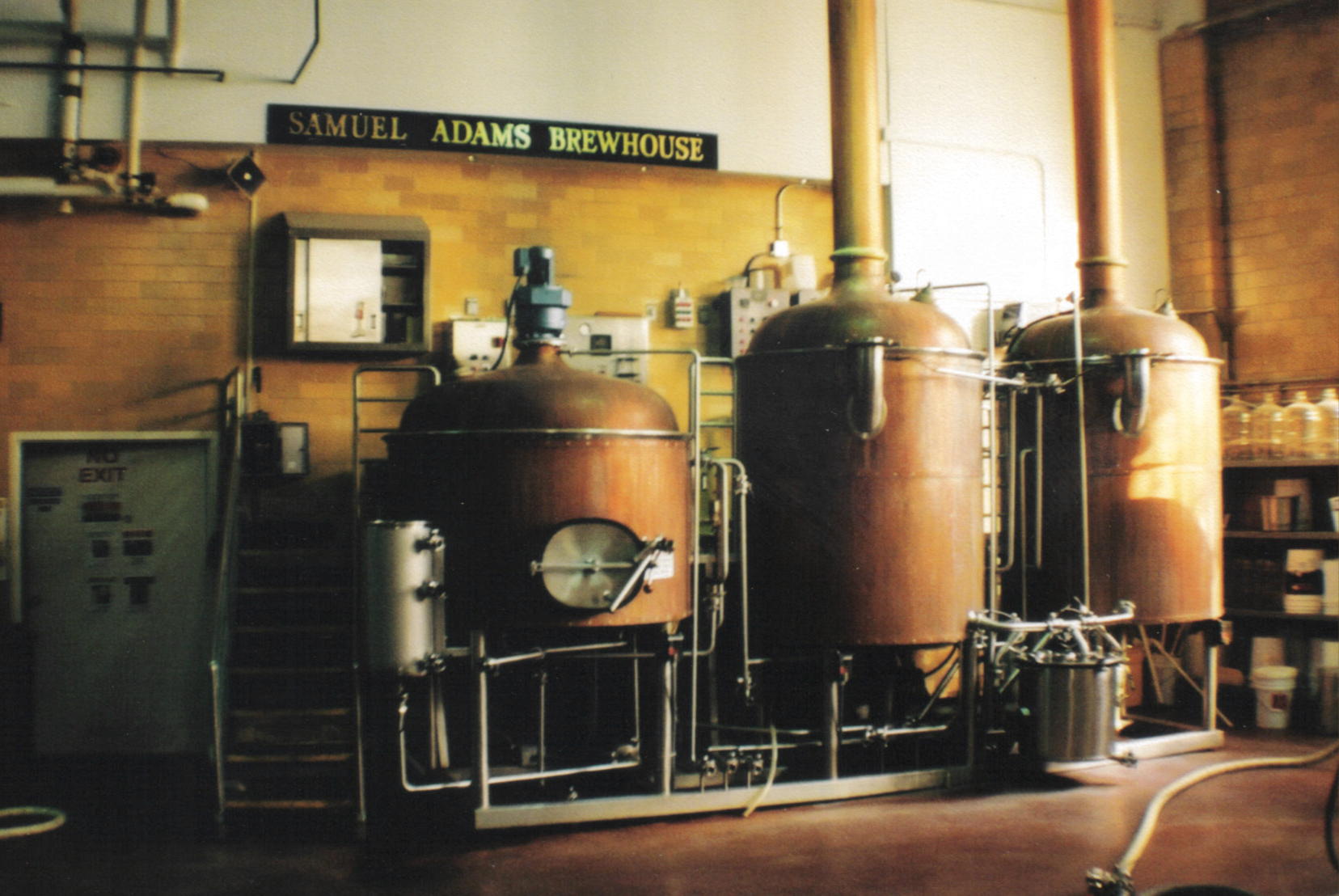
Despite its importance in the growth of craft beer in America, Sam Adams has fallen by the wayside. Hardcore beer nerds won’t buy their beer because it’s too mainstream while people getting into craft beer might quickly move on to other things. Not exactly an enviable position, but that hasn’t stopped them from putting out a tremendous amount of solid beer. Their Cherry Wheat was a mainstay for me in college, while their seasonal samplers (which they pioneered) always offer a solid drinking experience. Utopias (the 28% ABV monster that supposedly drinks more like a brandy or cognac) is on my bucket list, and I can’t say enough about Nitro cans, of which they have three including an IPA. Even if you’re in a craft beer wasteland, you’ll likely still be able to find Sam Adams, which makes them craft beer royalty in my book.

In the interest of full transparency, I’m not a huge fan of Oktoberfests/Märzens. They tend to be on the maltier side of the spectrum and I prefer my non-stouts and porters to have a weaker malt presence. But, seeing as Sam Adams brews the only American craft Octoberfest bier to be served in Germany during Octoberfest, I figured the situation called for it. Pouring a deep copper, Sam Adams Octoberfest has a moderate amount of carbonation and a loose head that dissipates fairly quickly. The first whiff is dominated by the smell of caramel and toffee which perfectly matches the color. Sweet caramel dominates the flavor, almost to the point of being cloyingly sweet. There are some bready characteristics, but not much in terms of roastiness despite the dark amber color of the beer. Besides some bitterness lingering on the palate, there’s not much in terms of hoppiness either. It’s a malt bomb in every sense of the word. After finishing it, I had little desire to have another one, as one was definitely enough; not in the sense that it’s undrinkable however. Definitely smooth drinking, almost chewy, and enjoyable, but the sweetness was simply too much to drink multiples in the same sitting. The thought of imbibing this while stuffing my face with sausages and pretzels makes my stomach hurt. As a stand alone beer, perhaps an after dinner drink or over a discussion over where the British can stuff their taxes, it’s a good, but not revolutionary, decision.
Update (5/2020): I’ve become huge fan of märzens. While I haven’t had Sam Adams ‘Oktoberfest’ since I initially wrote this article, the style has wormed its way into my heart. Reading this description admittedly makes me cringe, but I’ll leave it up in the interests of reminding myself how far I’ve come over the years.
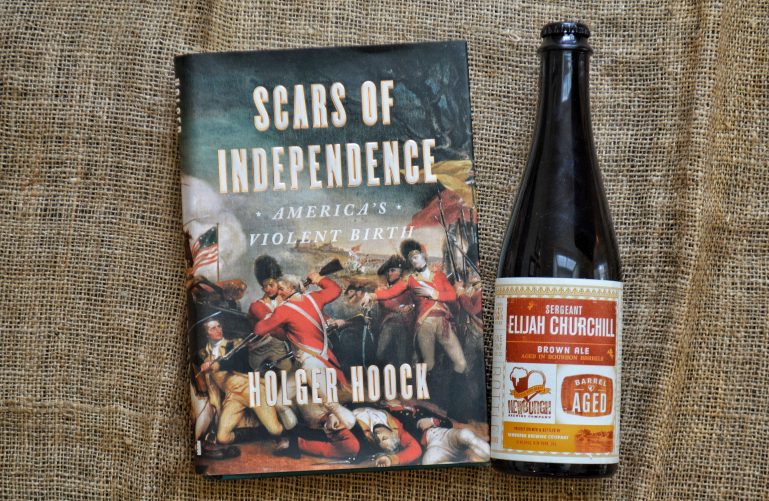
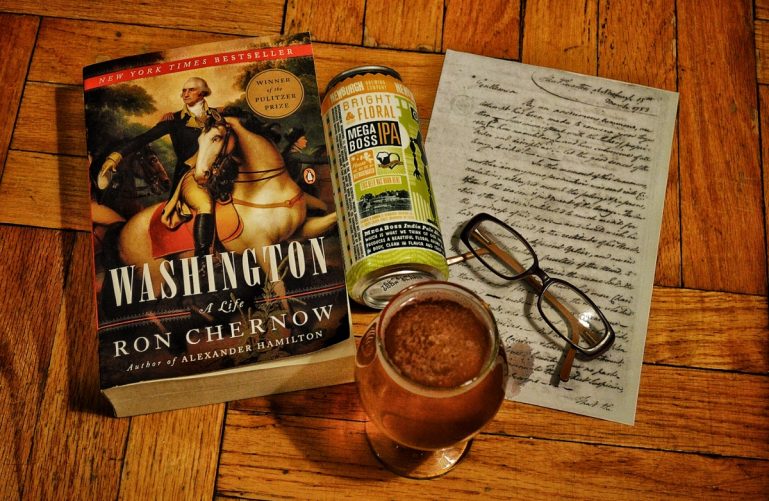
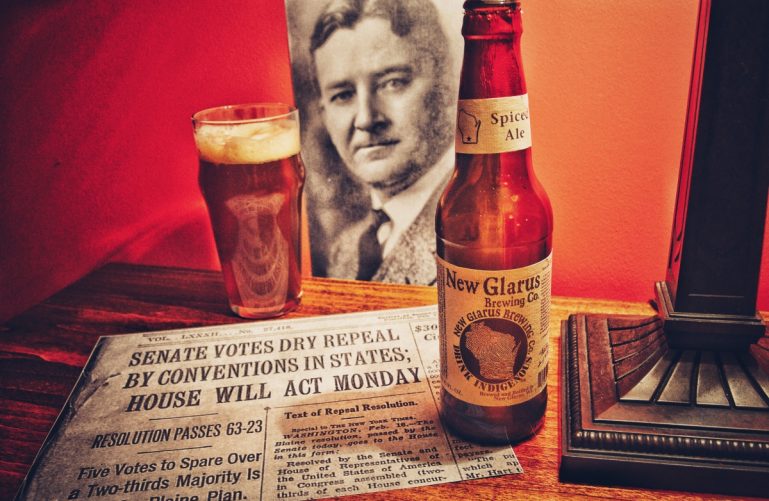
no comments